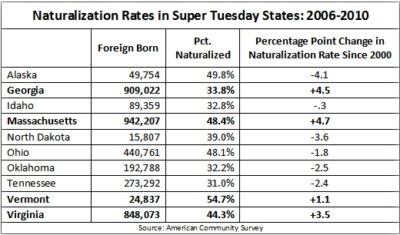Immigration Reform
The last time Congress updated our legal immigration system was November 1990, one month before the World Wide Web went online. We are long overdue for comprehensive immigration reform.
Through immigration reform, we can provide noncitizens with a system of justice that provides due process of law and a meaningful opportunity to be heard. Because it can be a contentious and wide-ranging issue, we aim to provide advocates with facts and work to move bipartisan solutions forward. Read more about topics like legalization for undocumented immigrants and border security below.
Mother Jones Exposes Inner Workings of the Self-Deportation Movement
In its March/April issue, Mother Jones Magazine goes “inside the self-deportation movement,” exploring “164 state anti-immigration bills and the forces behind them.” The concept of “self deportation,” popularized by GOP presidential contender Mitt Romney, is central to the philosophy of “attrition through enforcement.” The basic idea is that, if you make life hard enough for unauthorized immigrants, they will pick up and leave of their own accord, which means the state will not have to hunt them down, detain them, and deport them. Read More

Pew Analysis Highlights Immigrant Integration and Economic Contributions
Immigrants integrate into U.S. society over time and they contribute to the U.S. economy. These crucial yet often-overlooked facts are illustrated well by the Pew Hispanic Center’s latest statistical profile of the foreign-born population. According to Pew’s analysis of Census data, most immigrants have been here for more than a decade, and the longer they have been here, the more likely they are to have become homeowners and learned English. Moreover, growing numbers of immigrants are becoming U.S. citizens, which translates into growing political clout. The Pew data also show the degree to which immigrants fuel labor-force growth and fill valuable roles in the economy as workers in both high-skilled and less-skilled occupations. In short, immigrants are integral to the nation’s social and economic fabric. Read More

Number of Potential Immigrant Voters on the Rise in Key Super Tuesday States
Three of the twelve states holding Republican primaries or caucuses on Super Tuesday—Georgia, Massachusetts and Virginia—show especially strong trends in the numbers of foreign-born residents who have become U.S. citizens. This trend is significant given that these new Americans are able to register and vote. Immigrant communities in each of these states are large, exceeding 800,000 persons, and make up almost 10% or more of the statewide population. In fact, these three states are home to 71% of all immigrants living in the Super Tuesday states. While we don’t yet know how many of these naturalized U.S. citizens will vote on Super Tuesday or in the general election, GOP presidential candidates—many of whom have taken a hard line on immigration—would do well to take note of this trend. Read More

Number of Potential Immigrant Voters on the Rise in Key Super Tuesday States
Three of the twelve states holding Republican primaries or caucuses on Super Tuesday—Georgia, Massachusetts and Virginia—show especially strong trends in the numbers of foreign-born residents who have become U.S. citizens. This trend is significant given that these new Americans are able to register and vote. Immigrant communities in each of these states are large, exceeding 800,000 persons, and make up almost 10% or more of the statewide population. In fact, these three states are home to 71% of all immigrants living in the Super Tuesday states. While we don’t yet know how many of these naturalized U.S. citizens will vote on Super Tuesday or in the general election, GOP presidential candidates—many of whom have taken a hard line on immigration—would do well to take note of this trend. Read More

Government Agencies and E-Verify: Erroneous Results and Misuse Cost Workers Their Jobs
Making E-Verify mandatory—even for government agencies and contractors—could threaten the jobs of U.S. citizens because there are errors in the system and because employers misuse it. E-Verify is inaccurate. According to an evaluation by Westat commissioned by the Department of Homeland Security, approximately 0.8 percent of work-authorized U.S. citizens and legal immigrants received an erroneous “tentative nonconfirmation” from E-Verify. Approximately 0.3 percent of those workers were able to successfully contest their findings and keep their jobs. The remaining 0.5 percent were not able to correct their records and received an erroneous “final nonconfirmation.” Read More

New Data Highlights Immigrant Integration and Economic Contributions
A recent analysis of data from the Census Bureau highlights the degree to which immigrants integrate into U.S. society and contribute to the U.S. economy. In its latest statistical profile of the foreign-born population, the Pew Hispanic Center presents statistics which illustrate that most immigrants have been here for more than a decade, more become homeowners the longer they are here, and growing numbers are becoming U.S. citizens. Moreover, the data show the degree to which immigrants fuel labor-force growth and fill valuable roles in the economy as workers in both high-skilled and less-skilled occupations. Read More

Retiring Baby Boom Generation Will Rely on Immigrant, Hispanic Workforce
The U.S. population is rapidly growing older, which is having a dramatic impact on the U.S. labor force. The far-reaching effects of this demographic transformation are very much apparent in the projections released in January by the Bureau of Labor Statistics (BLS). As explained by Rakesh Kochhar of the Pew Hispanic Center, the BLS numbers indicate that “the aging of the non-Hispanic white population is expected to reduce their numbers in the labor force.” At the same time, “the Hispanic population is growing rapidly due to births and immigration.” For those reasons, says Kochhar, the BLS projections indicate that Latinos “will account for three-quarters of the growth in the nation’s labor force from 2010 to 2020.” Read More

Report by Maryland State Panel Details Positive Approach to Immigration
A new report from the Commission to Study the Impact of Immigrants in Maryland concludes that immigrants bring a plethora of economic, social, and cultural contributions to the state of Maryland. The commission, which was created by the Maryland General Assembly, also warns against attempts to deal with unauthorized immigration through enforcement-only policies that needlessly sow fear and distrust in immigrant communities. Rather, the commission admonishes, “Maryland must remain welcoming to immigrants, and the state and its local jurisdictions should further strengthen its efforts to integrate immigrants into the economy and the community.” Read More

Tuition Equity Bills Continue to Build Momentum in State Legislatures
By ALVIN MELATHE AND SUMAN RAGHUNATHAN, PROGRESSIVE STATES NETWORK While federal efforts to fix our broken immigration system remain on hold, support is growing among state lawmakers for common-sense, proactive approaches that welcome immigrants and expand opportunity for all, both immigrant and native-born. Across the country, a growing and diverse number of forward-thinking state legislators are turning away from unconstitutional, divisive, and economically devastating approaches taken by states such as Arizona and Alabama. Instead they are advancing inventive policies that make economic sense for states’ bottom lines and uphold their reputations. One such approach, tuition equity, continues to gain political and popular support and build momentum in statehouses across the country. Read More
Make a contribution
Make a direct impact on the lives of immigrants.
